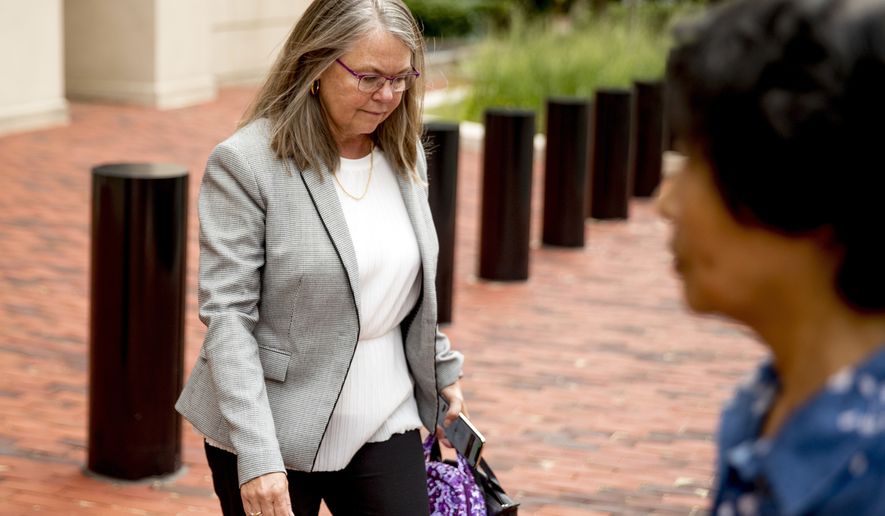Saying her conduct was “inappropriate” an accountant for Paul Manafort admitted Friday that she submitted false loan documents and tax returns under pressure from the former Trump campaign chairman.
Cindy Laporta, an accountant with Kositzka Wicks & Co. testified that she classified income from foreign companies allegedly controlled by Mr. Manafort as “loans” so he could avoid paying taxes on it. She also told bank officials a loan to Mr. Manafort had been forgiven despite having no documentation that was the case.
“I prepared the tax returns and communicated with banks based on information that Mr. Gates and Mr. Manafort provided to me that I didn’t believe,” Ms. Laporta testified.
Ms. Laporta is the first witness to testify under a grant of immunity in Mr. Manafort’s trial on charges of tax and bank fraud. The trial entered its fourth day with more testimony about Mr. Manafort’s suspicious financial transactions in the first trial to be brought by special counsel Robert Mueller’s Russia investigation.
The stunning revelations from Ms. Laporta included her description of how Mr. Manafort’s business associate Rick Gates pressured her to modify a loan amount to decrease his bosses’ tax bill.
In September 2015, Mr. Gates asked Ms. Laporta to increase the amount of a loan by several thousands of dollars, thus reducing Mr. Manafort’s tax burden. Ms. Laporta recalled Mr. Gates telling her the potential tax bill was too high and Mr. Manafort “didn’t have that money.”
Ultimately, she listed the loan at $900,000, but prosecutors didn’t disclose the original amount.
“It was not appropriate,” Ms. Laporta said. “You can’t pick and chose what’s a loan and what’s income.”
Ms. LaPorta testified she didn’t pushback against Mr. Manafort because she feared initiating a legal fight with Mr. Manfaort or upsetting one of the firm’s most important clients. So she went ahead and filed the false tax return.
“I very much regret it,” she told prosecutor Uzo Asonye.
But Ms. Laporta’s actions weren’t just limited to filing possible false tax returns. She also conceded to helping Mr. Manafort mislead two banks when applying for mortgages on two properties he owned in New York City.
Mr. Manafort had claimed a company called Paranova Holdings had loaned him $1.5 million over several years. However, prosecutors have alleged that money actually came from an overseas shell company Mr. Manafort had controlled.
Either way, in 2016 when Mr. Manafort sought a home loan from Citizens Bank, the bank worried that his company, DMP International, could not afford to repay Paranova. Mr. Gates responded by sending a forged forgiveness letter, Ms. Laporta testified.
The letter was back-dated nearly eight months earlier and included no signatures. Mr. Gates said he would “chase down signatures,” an indication that the letter was fake. It was later signed by a “Georgia Chystostomides.”
Ms. Laporta then took Mr. Gates’ letter, which was in an easily modified Microsoft Word file, and saved it as a .PDF, which gave it more authenticity. Then she sent it to Citizens Bank as evidence the loan ad been forgiven.
When asked if she believed the loan had been forgiven, Ms. Laporta hesitated before saying, “no.” She also conceded that she knew the letter was false “because of the dates.”
“I honestly believed that the bank would have to vet that document themselves and I felt protected by having [Mr. Gates and Mr. Manafort] prepare that document,” she said. “I wanted it to be the client’s document.”
Ms. Laporta also told the court that when Mr. Manfort was trying to get a loan from Federal Savings Bank, she stepped in to produce a profit and loss statement that showed $2.5 million of income Mr. Manafort earned in the Ukraine would be deposited into his account.
When asked if she believed Mr. Manafort would actually receive the money, Ms. Laporta responded, “I have no idea.”
She said she never sent a profit and loss statement because she never received documentation from Mr. Manafort. But later she emailed Federal Savings Bank and said Mr. Manafort was expected the funds at his direction.
Ms. LaPorta’s testimony is likely a blow to defense attorneys’ claim that Mr. Gates was the one responsible for the bank and tax fraud. She testified that Mr. Manafort had emailed her about the fraudulent loan.
Kevin Downing, a defense attorney for Mr. Manafort, said he would need about an hour to cross-examen Ms. Laporta. That was somewhat surprising given that the defense counsel has thrown relatively few questions at prosecution witnesses.
Earlier in the day, another accountant told testified that Mr. Gates and Mr. Manafort provided documentation for a suspicious foreign, not the lender.
Phillip Ayliff said a $1.5 million loan from an entity called Pernova Holdings raised a red flag because there was no documentation. But attempts to verify the loan’s terms were futile.
“There normally wasn’t a response, they just said it was a loan,” Mr. Ayliff testified of the response he got from Mr. Manafort and Mr. Gates.
Prosecutors for special counsel Robert Mueller have alleged Pernova Holdings was an overseas shell company used by Mr. Manafort to hide money he made in Ukraine from the IRS.
They have also accused Mr. Manafort of disguising income drawn from these accounts as loans to avoid paying taxes on it.
Mr. Ayliff said if Pernova Holdings was controlled by Mr. Manafort the money would be counted as income and, therefore, taxable.
He said Mr. Gates and Mr. Manafort took steps to hide Mr. Manafort’s alleged control of the entity.
“We thought it was an independent third party,” he said.
• Jeff Mordock can be reached at jmordock@washingtontimes.com.




Please read our comment policy before commenting.